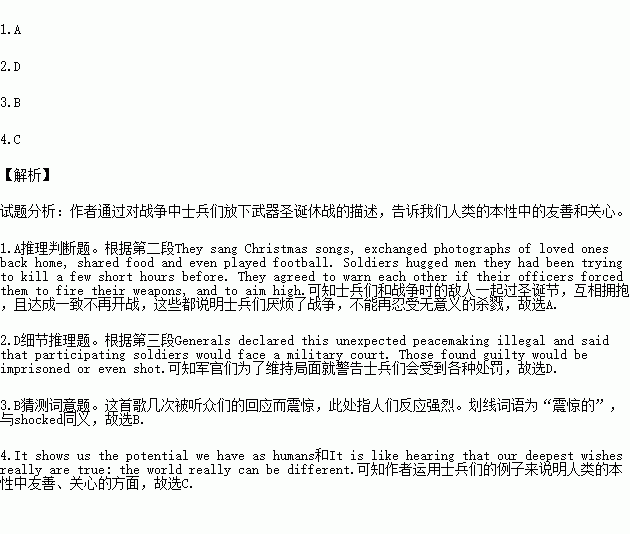题目内容
It was December 25, 1914, only 5 months into World War I. German, British, and French soldiers, already sick and tired of the senseless killing, disobeyed their superiors and started socializing with “the enemy” along two-thirds of the Western Front.
German troops held up Christmas trees with signs “Merry Christmas”. Thousands of troops ran across the battlefields covered with dead bodies. They sang Christmas songs, exchanged photographs of loved ones back home, shared food and even played football. Soldiers hugged men they had been trying to kill a few short hours before. They agreed to warn each other if their officers forced them to fire their weapons, and to aim high.
Fear ran through the military leaders on both sides. They felt that their power was being challenged: soldiers declaring their brotherhood with each other and refusing to fight. Generals declared this unexpected peacemaking illegal and said that participating soldiers would face a military court. Those found guilty would be imprisoned or even shot. By March 1915 the socializing movement had been destroyed and the killing machine was back in full operation. Over the next three years more than fifteen million people died in the war.
Not many people have heard the story of the Christmas Truce(休战). On Christmas Day, 1988, a local radio host in Boston played “ Christmas in the Trenches”, a song about the Christmas Truce, several times and was stunned by his listeners’ response. Thousands of people called in, praising the song, with many moved to tears by the amazing events it describes.
You can probably guess why the callers were in tears. The Christmas Truce story goes against most of what we have been taught about people. It lets us see the world as it can be and says, “This really happened once.” It shows us the potential we have as humans, and contradicts all of those TV and newspaper stories that tell us how mean and heartless people are. It is like hearing that our deepest wishes really are true: the world really can be different.
1.The soldiers began socializing with the enemy because ______.
A. they couldn’t bear the meaningless killing.
B. it was the best way to avoid being killed.
B. they feared that they would be caught.
D. their enemies were from similar backgrounds.
2.How did the generals finally put an end to the soldiers’ socializing?
A. They sent the soldiers’ loved ones to prison.
B. They moved the two groups of soldiers further apart.
C. They increased the number of officers to control the soldiers.
D. They warned the soldiers that they would face severe punishment.
3.The underlined word “stunned” in Paragraph 4 most probably means “____”.
A. satisfied B. shocked C. amused D. confused
4.The author uses the story of the soldiers to imply that human beings ____.
A. are not trustworthy under stress.
B. are naturally aggressive and warlike
C. are basically caring and kind-hearted
D. will always do what is in their own self-interest
 金牌教辅培优优选卷期末冲刺100分系列答案
金牌教辅培优优选卷期末冲刺100分系列答案
